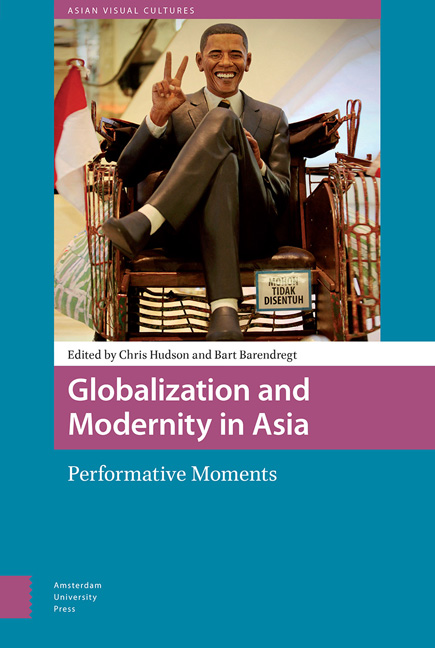Book contents
- Frontmatter
- Contents
- List of Figures
- Acknowledgments
- 1 Global Imaginaries and Performance in Asia
- 2 Globalizing the Imagination: Introductory Reflections
- 3 Weddings, Yoga, Hook-ups: Performed Identities and Technology in Bali
- 4 Super Premium Soft Double Vanilla Rich and the Ideal of Convenience in Japan
- 5 Unearthing the Past and Re-imagining the Present: Contemporary Art and Muslim Politics in a Post-9/11 World
- 6 Keeping Communists Alive in Singapore
- 7 Performative Pedagogies: Lifestyle Experts on Indian Television
- 8 Performing Cities: The Philippines Pavilion at the 2010 Shanghai International Exposition
- 9 Mobile Performance and the In-between: Yogyakarta Comes to Melbourne
- 10 An Islamist Flash Mob in the Streets of Shah Alam: Unstable Genres for Precarious Times
- 11 Pure Love?: Sanitized, Gendered and Multiple Modernities in Chinese Cinemas
- 12 Yogya on Stage
- Index
1 - Global Imaginaries and Performance in Asia
Published online by Cambridge University Press: 11 December 2020
- Frontmatter
- Contents
- List of Figures
- Acknowledgments
- 1 Global Imaginaries and Performance in Asia
- 2 Globalizing the Imagination: Introductory Reflections
- 3 Weddings, Yoga, Hook-ups: Performed Identities and Technology in Bali
- 4 Super Premium Soft Double Vanilla Rich and the Ideal of Convenience in Japan
- 5 Unearthing the Past and Re-imagining the Present: Contemporary Art and Muslim Politics in a Post-9/11 World
- 6 Keeping Communists Alive in Singapore
- 7 Performative Pedagogies: Lifestyle Experts on Indian Television
- 8 Performing Cities: The Philippines Pavilion at the 2010 Shanghai International Exposition
- 9 Mobile Performance and the In-between: Yogyakarta Comes to Melbourne
- 10 An Islamist Flash Mob in the Streets of Shah Alam: Unstable Genres for Precarious Times
- 11 Pure Love?: Sanitized, Gendered and Multiple Modernities in Chinese Cinemas
- 12 Yogya on Stage
- Index
Summary
Performing the Global
It is now widely accepted that a key feature of life in our era is the deepening engagement of the local with the global. Ulrich Beck has defined globalization as:
a non-linear, dialectic process in which the global and the local do not exist as cultural polarities but as combined and mutually implicating principles. These processes involve not only interconnections across boundaries, but transform the quality of the social and political inside nation-state societies. (Beck 2002, p. 17)
The consequences of these mutually implicating principles, and the social and political transformations they might bring about, have been well examined in the context of cultural, economic and technological flows between sites in the developed world. Less attention has been paid to global circuits of exchange outside the West. Some notable exceptions have highlighted interconnections between countries of the global South and increasingly intense inter-Asia cultural flows (see, for example, Iwabuchi et al. 2004; Chen and Chua 2007; Chen 2010; Goh 2015). Cultural flows exceed and move beyond economic and political relationships, resulting in cultural traffic that can often be found moving in many different directions simultaneously (cf. Ahmed and Donnan 1994). To fully grasp the power of globalization to collapse the polarities and transform culture at the local or national level, we need to look beyond the economic, financial and material aspects to the imaginative and less tangible dimensions of social reality. Novel ideas and meanings can also transform local cultural sensibilities and give rise to an expanded consciousness – what we now understand, after Manfred Steger, as the ‘global imaginary’ (Steger 2008). Images and symbols of the global that can promote this new consciousness increasingly appear in the public domain, in particular, but not exclusively, in the urban, mediatized and consumption-oriented spaces we recognize as sites of modernity. Alongside these visual cues, certain performative practices have the power to create an imagined connection with the global. These imaginaries, as Steger asserts, acquire solidity – a sense of the ‘real’– through the (re)construction of social space and the repetitive performance of certain communal qualities (Steger 2008, p. 7). How this awareness of the global is generated in specific contexts and sites of cultural activity still remains to be discovered.
- Type
- Chapter
- Information
- Globalization and Modernity in AsiaPerformative Moments, pp. 11 - 28Publisher: Amsterdam University PressPrint publication year: 2018



